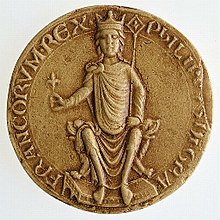| Philip II | |
|---|---|
 Seal of Philip II. The legend reads: phillipvs dei gratia francorvm rex ("Philip, by the grace of God, king of the Franks") | |
| King of the Franks/France[a] | |
| Reign | 18 September 1180 – 14 July 1223 |
| Coronation | 1 November 1179 (as co-king) |
| Predecessor | Louis VII |
| Successor | Louis VIII |
| Born | 21 August 1165 Gonesse, France |
| Died | 14 July 1223 (aged 57) Mantes-la-Jolie, France |
| Burial | |
| Spouses |
|
| Issue more... | |
| House | Capet |
| Father | Louis VII of France |
| Mother | Adela of Champagne |
Philip II (21 August 1165 – 14 July 1223), also known as Philip Augustus (French: Philippe Auguste), was King of France from 1180 to 1223. His predecessors had been known as kings of the Franks (Latin: rex Francorum), but from 1190 onward, Philip became the first French monarch to style himself "King of France" (rex Francie).[a] The son of King Louis VII and his third wife, Adela of Champagne, he was originally nicknamed 'God-given' (Dieudonné) because he was a first son and born late in his father's life. Philip was given the epithet "Augustus" by the chronicler Rigord for having extended the crown lands of France so remarkably.
After decades of conflicts with the House of Plantagenet, Philip succeeded in putting an end to the Angevin Empire by defeating a coalition of his rivals at the Battle of Bouvines in 1214. This victory would have a lasting impact on western European politics: the authority of the French king became unchallenged, while the English King John was forced by his barons to assent to Magna Carta and deal with a rebellion against him aided by Philip's son Louis, the First Barons' War. The military actions surrounding the Albigensian Crusade helped prepare the expansion of France southward. Philip did not participate directly in these actions, but he allowed his vassals and knights to help carry them out.
Philip transformed France into the most prosperous and powerful country in Europe.[5] He checked the power of the nobles and helped the towns free themselves from seigneurial authority, granting privileges and liberties to the emergent bourgeoisie. He built a great wall around Paris ("the Wall of Philip II Augustus"), re-organised the French government, and brought financial stability to his country.
Cite error: There are <ref group=lower-alpha> tags or {{efn}} templates on this page, but the references will not show without a {{reflist|group=lower-alpha}} template or {{notelist}} template (see the help page).
- ^ Guenée 1981, p. 158. "En 1190, Rex Franciae aparait dans quelques actes influencés par les traditions des Plantagenets. Puis en 1196 l'expression se trouve dans des actes quelconques. En juin 1204 enfin, Philippus rex Franciae est utilisé dans les protocole initial des lettres royales. Et en juin 1205 apparait pour la première fois Regnum Francie".
- ^ Babbitt 1985, p. 39 (note 34).
- ^ Broun 2015, p. 176.
- ^ Baldwin 1991, pp. 360–361.
- ^ Flori & Tucker 2019, p. 999.